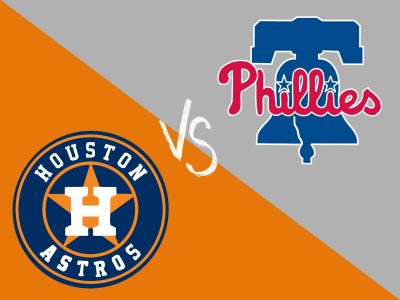The World Series is already underway, and while many baseball fans are cheering for Philadelphia, everyone except Phillies fans should be cheering for the Houston Astros.
I’m not an Astros fan. I like the small-market Cleveland Guardians — a team I wrote about a few weeks ago — and it seems divine intervention isn’t enough when the MLB puts its thumb on the pinstriped side of the scale. But I want the Astros to win because of my love for the little guy.
The Philadelphia Phillies are the antithesis of moneyball. They spend big — fourth in the major leagues at over $250 million in payroll — and don’t know what finding value is. Their strategy is simple: waive massive contracts in front of big-name free agents and see what happens.
This year, the Phillies’ splashy strategy has worked, and they’ve made it to the World Series. Phillies fans should rejoice, but baseball fans should recoil.
Of the first five hitters in the Philadelphia Phillies World Series lineup — Kyle Schwarber, Rhys Hoskins, J.T. Realmuto, Bryce Harper and Nick Castellanos — only one, Hoskins, was drafted by the Phillies. The other four are expensive bats-for-hire that many teams cannot afford.
Contrast the mercenary Phillies with the loyal Houston Astros, whose lineup is nearly all Astros products. In their Game 3 World Series lineup, their first eight hitters—Jose Altuve, Jeremy Peña, Yordan Alvarez, Alex Bregman, Kyle Tucker, Yuli Gurriel, David Hensley and Chas McCormick — have all spent their entire careers with Houston.
Love them or hate them, the Houston Astros have drafted and developed talent well, and their success can be attributed to keeping high-end players in-house. To be sure, Houston also has a sizable payroll — ninth in the majors at about $190 million. But much of it is spent on players they developed. It’s more than fair for a team to spend on players they brought up.
The Astros’ strategy of scouting, developing and retaining talent is replicable for many teams. The Phillies’ style of pay-to-win is not.
But in a league that just generated $11 billion in revenue in 2022, why can’t all these megarich owners just pony up? Is Phillies owner John Middleton more generous to his fanbase, giving them a roster full of big names to cheer for?

To the common fan, the instinct to blame small-market owners for lacking Middleton’s audacity is tempting but flawed. And I speak from experience. I’m a Cleveland fan, and I know Guardians owner Paul Dolan for the cheapskate he is. However, and it burns my soul to write this, Dolan has a valid excuse not to spend like Middleton.
The Cleveland Guardians took in $50 million less than the Phillies last year. Much of the disparity can be explained by a significant source of baseball revenue for each team: local television deals.
Baseball is a regional sport, and the difference in local television deals explains why big-market teams can blow small-market teams out of the water with mountains of cash.
For example, consider the Phillies, who draw from a metro population of over six million and a local television deal worth around $100 million per year. Then see Cleveland, with a metro population of about two million and a local television deal worth around $50 million annually.
Philadelphia, like New York or Los Angeles, is a large market with lots of viewers to pump up the value of its local television deal. That allows the Phillies to spend now and ask questions later. Small-market teams don’t have that luxury.
So for those who don’t know why anyone wouldn’t cheer for the Astros, I have to address the loud part out loud: the Astros cheated their way to a World Series title in 2017.
If I were MLB commissioner, I would strip the 2017 title and suspend all the players involved for 90 games or more. But that year has nothing to do with this one, and I prefer to hate the game, not the player.
And to be fair to Philadelphia, it isn’t personal. Any big-money World Series champion perpetuates a pay-to-win model that, absent a hard salary cap, is inevitable given baseball’s business structure around local TV revenue.
I know it’s hard to cheer for a team that banged on trash cans to give themselves an advantage that led to a championship. But Houston’s infraction has already been paid for in the hearts of baseball fans. Many, including me, will forever put an asterisk next to the 2017 Astros’ title.
If the Phillies win, however, they will have broken no rules. Instead, small-market teams like my Guardians will be left looking at how efficiently they created a 92-win roster — but how none of it matters because baseball has become a rigged game in which a lack of deep pockets all but guarantees postseason futility.
Houston has built its roster the right way: drafting and developing good players and keeping them in-house so the fanbase can learn to love a team of players that are genuinely the organization’s own. Fans may hate many of the Astros’ stars, but nobody can deny that most of them are Astros through and through.
A win for Houston would send a message to teams like Milwaukee, Cleveland and Oakland that if you’re as smart as the Astros and are willing to pay your own guys and sign a free agent or two, you can also be world champions.














